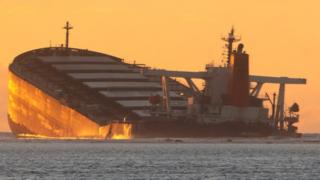Image copyright
Jean Mary Garrett
The oil spill has caused an environmental disaster in Mauritius
Almost all the fuel oil from the Japanese-owned ship that has caused a huge oil spill off the coast of Mauritius has been pumped out, Prime Minister Pravind Jugnauth has said.
The operation had been a race against time, he added, amid fears that the MV Wakashio would break up.
The ship, believed to have been carrying 4,000 tonnes of fuel oil, ran aground on a coral reef on 25 July.
Mauritius is home to world-renowned coral reefs, and popular with tourists.
- Africa Live: News and views from the continent
- What is Mauritius like?
The fuel has been transferred to shore by helicopter and to another ship owned by the same Japanese firm, Nagashiki Shipping.
France has sent a military aircraft with pollution-control equipment from its nearby island of Réunion, while Japan has sent a six-member team to assist the French efforts.
The Mauritius coast guard and several police units are also at the site in the south-east of the island.

Media playback is unsupported on your device
Mr Jugnauth said more than 3,000 of the 4,000 tonnes of oil from the ship’s fuel reservoirs had been pumped out. A small amount remained on board elsewhere.
Police spokesperson Shiva Cooten said they “still have work to do but the situation is all under control”.
Earlier, police chief Khemraj Servansing said that cracks in the ship “keep increasing”.
“It is difficult to say when it will break but we have a boom deployment plan with the French Navy helping and we have made provisions for high sea booms,” he said.
The MV Wakashio ran aground at Pointe d’Esny, a known sanctuary for rare wildlife. The area also contains wetlands designated as a site of international importance by the Ramsar convention on wetlands.
How bad is the spillage?
On Friday, Mr Jugnauth declared a state of emergency and appealed for international help.
Since then, volunteers have also been collecting straw from fields and filling sacks to make barriers against the oil.
Others have made their own tubes with tights and hair to add to the effort, and some have been cleaning up the island’s beaches.
Their actions went against an order from the government asking people to leave the clean-up to local authorities.
Greenpeace Africa has warned that “thousands” of animal species were “at risk of drowning in a sea of pollution, with dire consequences for Mauritius’ economy, food security and health”.
An oceanographer and environmental engineer in Mauritius, Vassen Kauppaymuthoo, told the BBC that local residents were now “breathing heavy vapours of oil”, and there was a “mixture of sadness and anger” over the spill.
One of the best immediate assessments of the spill has come via Earth observation assets.
The US analytics company Ursa Space Systems has looked at the situation using radar data from the Finnish Iceye satellites, which are especially effective at picking out oil on water.
“On 6 August, we detected a spill size of roughly 3.3 sq km surrounding the Wakashio,” said Ursa’s Paul Frey. “We released another detection on 11 August for the same area showing a near 10-times increase (roughly 27 sq km),” he told BBC News.
Image copyright
Satellite image ©2020 Maxar Technologies
Satellite imagery on Wednesday showed booms placed along shorelines (arrows) to protect them from oil
Bigger disaster avoided
By Navin Singh Khadka, BBC World Service environment correspondent
The Mauritian prime minister’s announcement that almost all the remaining oil from the Japanese-owned ship has been pumped out certainly comes as good news.
The simple reason: the super-sensitive marine environment has now avoided suffering an oil spill three times worse than it has seen in the past few days. But, averted loss is one thing – the damage already done is another.
The fact remains that this uniquely biodiversity-rich marine ecosystem – one of the few left on Earth – has already been polluted by nearly 1,000 tonnes of fuel oil.
Marine biologists say that is enough for the long term consequences of the entire marine life – from coral reefs, to mangroves to endangered animals and birds. And the Mauritian economy is all about them.
Akihiko Ono, the executive vice-president of the ship’s operator, Mitsui OSK Lines, has “profusely” apologised for the spill and for “the great trouble we have caused”.
He has vowed that the company would do “everything in their power to resolve the issue”.
Police in Mauritius say they have been granted a search warrant, allowing them to board the vessel take away items of interest such as the ship’s log book in order to help with an investigation. The ship’s captain will assist officers with their search.
Image copyright
EcoMode Society
Communities have rallied together to protect their island


















